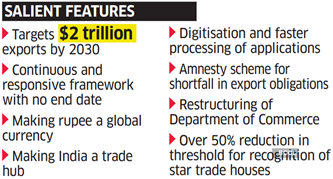

Context
The Commerce and Industry Ministry unveiled the new Foreign Trade Policy 2023-2028.
What is Foreign Trade Policy?
- Foreign trade policy are a set of guidelines and instructions which are established by Directorate General of Foreign Trade (DGFT) related to import and export of goods in India. This is announced after every 5 years.
- It creates various expectations for exporters, traders and manufacturers.
- India’s foreign trade policy is guided by the Foreign Trade (Development and Regulation) Act, 1992, which was adopted when the economic policy reforms were initiated.
- Foreign Trade Policy (2023) is based on continuity of time-tested schemes facilitating exports as well as a document which is nimble and responsive to the requirements of trade.
- It is based on principles of ‘trust’ and ‘partnership’ with exporters.
- It replaced the extant policy ‘FTP 2015-20’. The new FTP comes into effect from April 1, 2023.
Features of New Foreign Trade Policy 2023:
- Motto: Long term excellence and productivity.
- Aim: New policy aims to almost triple India’s goods and services exports to 2 trillion dollars by 2030, from an estimated 760 billion dollars in 2022-23.
- Internationalisation of the rupee trade: The major highlight of this policy was the internationalisation of the rupee trade.
- No Sunset date:
- The new policy will have no sunset date and will be tweaked based on the emerging world trade scenario and industry feedback.
- While the policy will be open-ended, the schemes sanctioned under it will be time bound.
- One time Amnesty: The new FTP is introducing a one-time Amnesty Scheme for exporters to close the old pending authorizations and start afresh.
- New growth areas: Opening up a new area of potential exports, the policy has included “merchanting trade” within its ambit.

- Exporters in India can source goods from another country and send them to a third country without touching Indian shores.
- This will also enable exports of restricted goods.
- Advance authorization Scheme:
- A Special advance authorisation scheme is being launched for the clothing and apparel sector so that they can react to market demands and fashion trends faster.
- Other mechanisms like star ratings to recognise exporters will be rejigged to lower qualification thresholds.
- Towns of Export Excellence:
- Four towns in Uttar Pradesh — Faridabad, Moradabad, Mirzapur and Varanasi — were announced as centres of export excellence for their performance in the apparel, handicrafts, handmade carpets and handlooms, respectively.
- The new trade policy will make all the PM Mitra textile parks eligible to get benefits as common services providers.
- Recognition of Exporters: Exporter firms recognized with 'status' based on export performance will now be partners in capacity-building initiatives on a best-endeavor basis.
- Others:
- PM Mega Integrated Textile Region and Apparel Parks additional scheme to claim benefits under CSP.
- The dairy sector gets benefits and will be exempted from maintaining the average export obligation.
- Battery electric vehicles, vertical farming equipment are added to the green technology product.
- Wastewater treatment and recycling, rainwater harvesting system added to green technology products.
- Rainwater filters and green hydrogen added to green technology products.
- Green technology products eligible for reduced export obligation requirement under the EPCG scheme.
New approach to Trade transit Facilities for adjacent countries
- The New Foreign Trade Policy (FTP) has introduced an additional consideration in providing such trade transit facilities for adjacent countries.
- Empowering Neighbourhood first policy: The changed language and subtle shift in the stance on trade with neighbouring countries in the new policy could unnerve some land-locked countries around India such as Nepal and Bhutan that rely on goods’ transit through India.
- In line India’s commitment to WTO: Freedom of transit to landlocked countries is guaranteed under Article V of the WTO’s General Agreement on Tariffs and Trade.
Issues/Gaps in the policy
- Ineffective at the present juncture:India’s foreign trade policy continues to be largely structured on the earlier policy documents, and draws its legal basis from the three-decade-old Foreign Trade (Development and Regulation) Act, its incongruence with the needs of present times is obviously huge.
- Lack of utilisation of FTAs: The government was unable to use the rules of the multilateral trading system as well as a majority of the 13 free trade agreements(FTA) that India has signed thus far.
- In most of these agreements, India’s trade deficit has ballooned and this is simply because the exporters have been unable to take advantage of the preferential market access that have been offered by the trade partners.
- Lack of preparedness related to regulatory standards: There is current pressure with India to devise Indian-specific standards, which is creating barriers to trade in a range of industry sectors. India frequently fails to notify the WTO of new standards and often does not allow time for discussion with its trading partners prior to implementation.
|
In 2021, the Indian government launched the “One Nation, One Standard” scheme with the aim of synergizing standards adopted by various Standard Development Organizations in India. |
Significance:
- Better partnership: The Foreign Trade Policy 2023 will achieve better export promotion by fostering partnerships between exporters, states, districts, and Indian Missions.
- Ease of doing business: The policy will prioritize enhancing the ease of doing business and targets emerging sectors, such as e-commerce and export hubs.
- New boost to the Indian foreign trade: India’s exports were $435 billion in 2015-16 when the previous policy was introduced and have grown nearly 75% to an estimated $760 billion in 2022-23. New policy will give new boost to this export growth.


